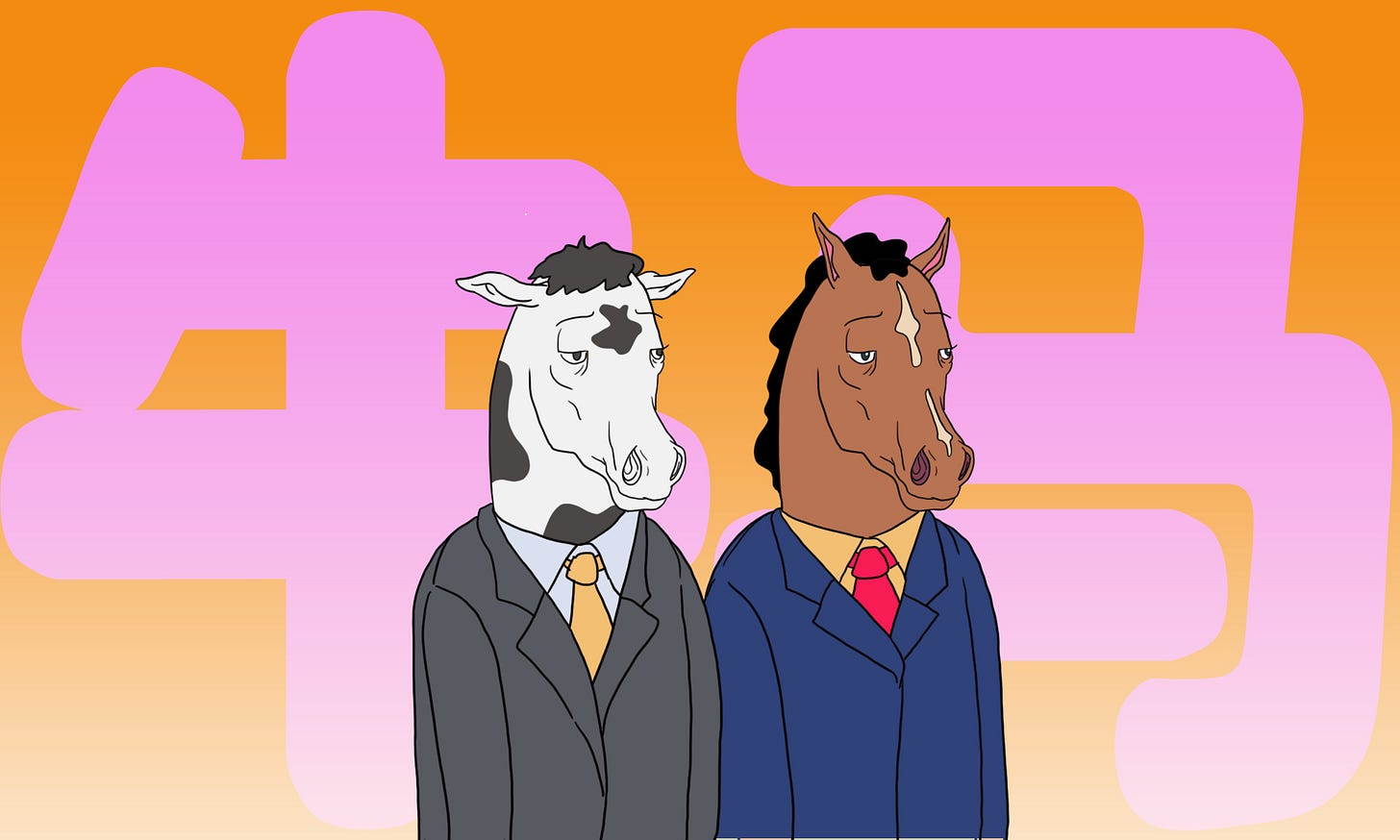"Workhorse" — Phrase of the Year
A phrase which defines the feelings of many in China in 2024

Context
In this edition of Sinica Chinese Phrase of the Week, the last of 2024, we announce our “Phrase of the Year”.
It’s a phrase that emerged repeatedly in discussions about working life in China this year, and captures the feelings of many young people in the workforce.
This term was a Phrase of the Week in March this year, and though not new, has gained cultural traction in 2024.
The phrase is: “Workhorse” (牛马).
“Workhorse” has flowed through many discussions in 2024.
Most recently, in December when creative netizens used the metaphor in discussions about the release of China's birth rate data:
On stormy days, as torrential rain pours down, cows will retreat to their shelters to sleep, and horses will stay in the stable eating grass.
But the [human] workhorse will find every possible way to go to the office. Cows moo, horses neigh, while workhorses reply:
"Received with thanks!"
暴雨天,大雨倾盆,牛会躲进窝里睡觉,马会在马棚吃草,而牛马会想尽办法出门干活,牛会哞,马会叫,牛马天天喊收到。
bàoyǔ tiān, dàyǔ qīngpén, niú huì duǒ jìn wō lǐ shuìjiào, mǎ huì zài mǎpéng chī cǎo, ér niúmǎ huì xiǎng jìn bànfǎ chūmén gànhuó, niú huì mōu, mǎ huì jiào, niúmǎ tiāntiān hǎn shōudào.
And with that we have our Sinica Phrase of the Year!
What it means
“Workhorse” directly translates as “cattle” (牛 niú) and “horses” (马 mǎ), sometimes translated as “beast of burden.”
The phrase stems from an age-old metaphor comparing “working people” (打工人 dǎgōng rén) to “social livestock” (社畜 shè chù)—those who rise early and toil endlessly, much like cattle and horses laboring for the "fodder" that sustains them.
“Workhorse” is an internet slang term that emerged in 2021, used metaphorically to describe people compelled to work hard for meager pay, with little hope of improving their circumstances.
The phrase likely draws inspiration from the four-character idiom, “to be a cow and a horse” (做牛做马 zuò niú zuò mǎ), meaning “to work hard and endure a difficult life for little reward.”
Its popularity has surged in 2024, appearing in six issues of the RealTime Mandarin newsletter throughout the year.
“Workhorse” entered the public consciousness in March when a student doctor, overwhelmed by the pressures of her job, tragically took her own life. She referred to herself as an “inadequate workhorse” (不合格的牛马), reflecting her exhaustion and sense of failure.
In April, internet users lamented at being “worthless workhorses” after a viral video showed a young schoolboy expressing his dream of succeeding his father as the President of the Agricultural Bank of China.
In June, employees of Manner Coffee described themselves as “workhorses” enduring exploitative conditions in what they called a “sweatshop” (血汗工厂).
By December, workers in the automotive sector also adopted the term, describing themselves as low-value "workhorses" (牛马) after BYD pressured suppliers to cut costs by 10%—a burden that would inevitably be passed onto employees.
"Workhorse" has become a defining phrase for many in China today, encapsulating feelings of exhaustion, frustration, and worthlessness in the workplace, often tinged with a touch of self-deprecating dark humor.
Its rise in popularity has displaced another commonly used phrase, “working people” (打工人 dǎgōng rén), in everyday conversations in China.
Expect to hear much more of this phrase in 2025!
Andrew Methven is the author of RealTime Mandarin, a multimedia resource to immerse you in the latest Chinese language trends and inspire you to practice and improve your Mandarin every week.
Read more about the top phrases of 2024 in this week’s RealTime Mandarin:



